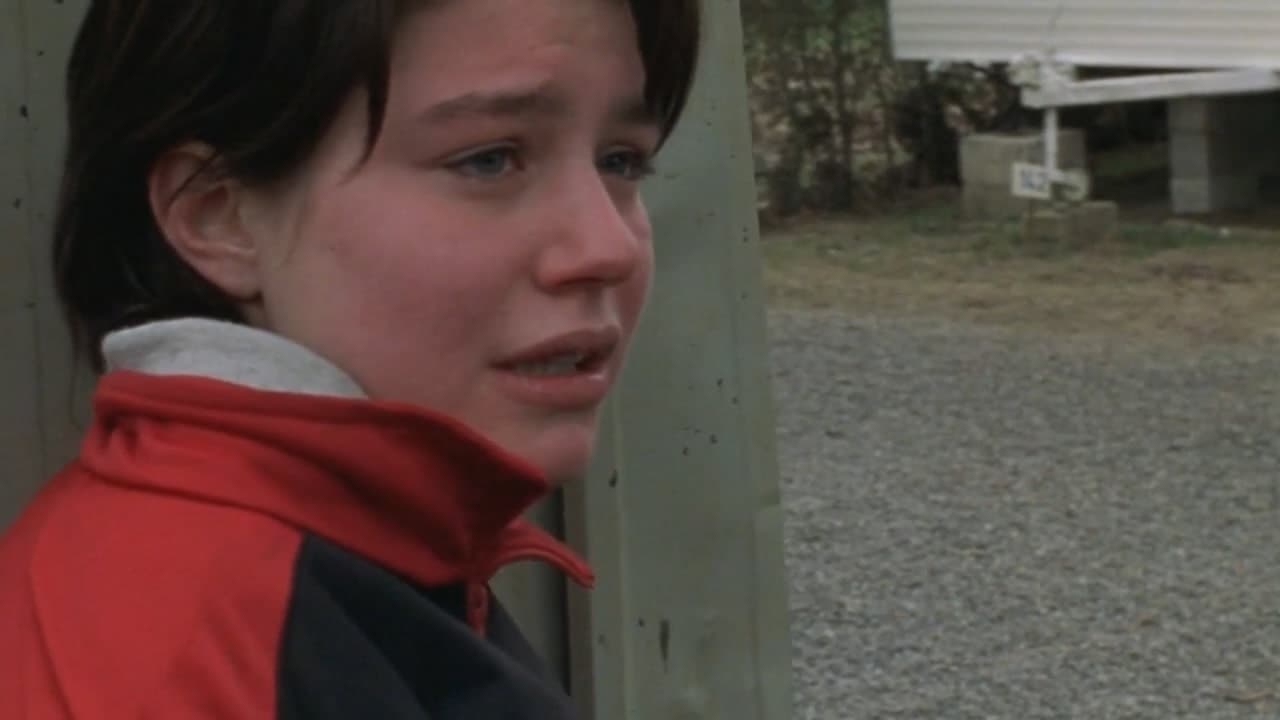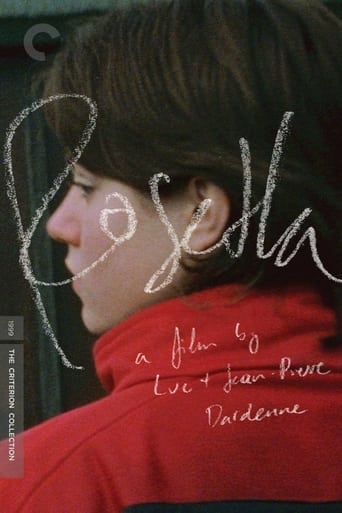

Rosetta, like many of the Dardenne brother's films, opens in medias res, with a young girl confronting an employer about being fired. We are immediately aware of the before and after of these events, and can conclude that this is a regular occurrence for Rosetta, being exploited as cheap labour for a limited period of time, and having to make a loud disgrace of herself when told the unfortunate news. It's impact is so visceral that the film in fact has proved to be the catalyst for reform for youth workers in Belgium.Near home, we see her repeat the same actions over and over; crossing a four laned road, checking the fish traps, refilling her bottle, putting on and taking off her boots and exchanging them for her 'nice' shoes, go all over town in search of a job. These are not exciting in any sense, but you see how it weighs her down, having to return to these tasks over and over to ensure her survival. The Dardennes reused this technique in Two Days One Night, and repeatedly forced Sandra to walk up long pathways, inquire with numerous strangers, and knock and ask the same questions again and again, and build up a sense of dread that came with each refusal. As Rosetta trudges through this day to day cycle, and asks the same questions, we begin to realise that it is not only a matter of financial security, but also her own pride being wounded by every rejection. We see her utter dedication to leave this life even as she is so familiar and efficient in all its facets. Her mother is the opposing force to this; clearly in denial mental issues and whoring herself out for a drink or two. Rosetta hates her, and her mindset that seems so at peace with their destiny of living their lives out in a trailer park, but reacts with the same anger when her mother is clearly being taken advantage of: "My mother's not a whore!" Her last vestiges of pride (throwing food away and refusing to beg or resort to charity) and her tough exterior are eviscerated in one startling scene of vulnerability and emotional distress - while trying to wrestle with her mother and convince her to apply for rehab, she is accidentally pushed into the river. Her mother's immediate reaction is so damning and harsh: she flees like she flees the reality that Rosetta forces her to try and confront. And Rosetta herself, her gruff, defensive voice put on to shield her from any perception of weakness, becomes shrill and desperate as it calls for mommy, to no avail. She meets Riquet, a young waffle worker whom may be the first and only friend in her life. When he rides up to the trailer park, she is supremely embarrassed, but he does not show any signs of ill will or prejudice. He is in fact kind to her, and it is so unexpected for Rosetta that as she lays in his bed at night, she has to repeat to herself or risk falling asleep and never waking up to a 'better life'. She is numb and cold to his open and kind reception; when has this ever lead to something good in her life? And then, as he falls into the water as she once did, she hesitates because it might just open up a spot for her to take. This act is less convincing than revealing his side waffle business to the boss; because we do not see this sort of malice from her at all previously (the fighting at the beginning is more born of desperation), and it feels uncharacteristically cold, even for someone who is looking out for herself. But this lends power to Riquet's final action, because of this hint of hesitation - the Dardennes reverse it and for once in her life she finds a little spot of solace, of compassion, that is so genuinely honest and good, even as Rosetta has done all of those things to him. It is shot in the same way as all of the Dardenne's work, but perhaps because of the subject matter, it is an even more harrowing vision of the neo-realism aesthetic. Long takes and body language are used to depict the heightened senses of Rosetta and how they have been tuned as a result of this lifestyle and to ensure survival; as she picks up on stray dialogue in the background about money being left in a till, as her body stoops in resignation of having to help her drunk mother up again, and in a subtle moment, as she nervously glances off-screen briefly at Riquet, whom has come to the store to survey her in his old position. Sometimes, the physical shaking of the camera does get a bit excessive, and is relied upon rather than the actual desperation of the body and facial expressions. And like always, there is no music to speak of, no sentimental chorus or signalling of moment of change. Just a repeated mantra that is whispered to no one but herself, because if it is not reaffirmed, she may lose hope altogether.
... View MoreRe-watched this film recently out of interest and vague, powerful memories of the lead actress, Emile Dequenne. I was very happy to have revisited it. In the years since seeing it, I have caught up on all the Dardenne brother films, and consider them to be among my favorite directors, observant, gentle, and tuned into a world I personally know very little about. His characters are alien to me - and indeed alienated themselves, though I grew up in Belgium I did not know anybody like Rosetta. The impact of a Dardenne brothers film is very intense, and are often very cathartic. Rosetta is no different. Filmed very sparsely, leaving characters with very little place to hide and ultimately displaying a profound vulnerability. It really belongs among the greatest films.
... View MoreTo say that Emilie Dequenne. the young actress playing Rosetta - and who won the Golden Palm at Cannes for her efforts here, is 'plucky', would sound patronising, to say the least.This is structured documentary film-making at its most urgent - and poignant. The premise for most could hardly be less appealing - an independent film, filmed at a moderately sized Belgian industrial town, with an actress who wears no make-up (yes, the odd pimple, too) has an alcoholic mother who gets more booze by offering herself for sex and they both 'inhabit' a tiny, leaky caravan on a caravan park.By plucky, I mean that Rosetta is almost always running - from someone, after someone - including her own mother - to a job, from a job. When not doing that, she gets thrown in a lake (by same person as above), catching fish in said very muddy lake, using a broken glass jar. She is always trying to either get work, keep her job or survive, somehow.This all sounds quite frantic - and it is, when the hand-held camera follows her, is glued to her, almost, as she goes past so close, she briefly goes out of focus. But often, it is meditative, thought- provoking and downright very ordinary. Which, oddly, is extremely compelling, never more so during the gaps in dialogue.Underneath this hardened facade - she only swears and fights when really pressed, then she's like a terrier dog - we hope to see a normal young lady, who can do things that she enjoys. We only see this once, when the young man at the new waffle-van where she finally gets a casual job, takes her after the first day, back to his, for food and playing of some music.If this is SO mundanely glum, why am I watching it for the second time? Well, my Halliwells Film Guide (bible, to me) rated it highly and I got a copy cheap as a Korean import and secondly, you just know that there is a message here. Not necessarily a very important one, but one that we need to reminded of, when we all (and our Governments) continually moan about the youth of today and how they never want to work - and about caring for those unable to care for themselves.It's also very sobering (definitely no pun intended) and one with an ending that you'll remember.
... View MoreThe heroine of this admirable but depressing French import is a sullen and troubled (both for good reason) teenager living in trailer trash penury with her alcoholic mother, and stubbornly pursuing what she calls "a normal life": defined as a paying job and someone to call a friend. Dramatic slices of life don't often come more lifelike than this, and thankfully so. It's about as far from Hollywood glitz and glamour as a film can get without becoming a documentary, taking as its subject part of an underclass typically ignored both on and off screen.The transparency of the script suggests a largely improvised scenario (there isn't much in the way of dialogue at any rate), and the performances are as natural as breathing. But the lack of any cosmetic crutches (music cues, sympathetic characters, a tidy resolution) can make watching it an oppressive experience, and all the restless, hand-held cinema veritè camera-work is enough to give the viewer a headache. The film won a handful of awards at Cannes, no doubt because it offers such an obvious stylistic rejection of the ongoing West Coast colonization of Europe, but there isn't anything here for audiences looking for entertainment.
... View More